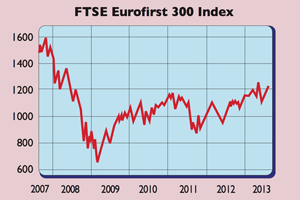Get the latest financial news, insights and expert analysis from our award-winning MoneyWeek team, to help you understand what really matters when it comes to your finances.
You are now subscribed
Your newsletter sign-up was successful
Want to add more newsletters?

Twice daily
MoneyWeek
Get the latest financial news, insights and expert analysis from our award-winning MoneyWeek team, to help you understand what really matters when it comes to your finances.

Four times a week
Look After My Bills
Sign up to our free money-saving newsletter, filled with the latest news and expert advice to help you find the best tips and deals for managing your bills. Start saving today!
"The eurozone is doing surprisingly well," says Richard Barley in The Wall Street Journal. The second quarter's GDP growth figure of 0.3%-1.1% annualised beat expectations and ended 18 months of recession. Recent business surveys suggest the positive momentum will continue.
Solid economic data and falling bond yields (in other words, falling borrowing costs) in the debt-soaked peripheral' countries have boosted sentiment. The pan-European FTSE Eurofirst 300 stock index has jumped 10% since late June. Spanish and Italian stocks are up 15%. Europe has outperformed America too of late, as its equity markets are more cyclical "and more exposed to low-quality financials", says Robert Farago of Schroders.
Will the bounce last?
More significant, however, is "the huge cargo tethered to the currency bloc's rear bumper", as Matthew Dalton puts it in The Wall Street Journal the "trillions of euros of private-sector debt" that Europe "has done little to address". The US appears to have managed to work off or write down enough of its debt to allow the private sector to start expanding again. But in many European countries consumers and companies remain weighed down by borrowings piled up in the boom years. Spain, Portugal, Ireland and Cyprus look especially vulnerable in this regard, according to the European Commission.
MoneyWeek
Subscribe to MoneyWeek today and get your first six magazine issues absolutely FREE

Sign up to Money Morning
Don't miss the latest investment and personal finances news, market analysis, plus money-saving tips with our free twice-daily newsletter
Don't miss the latest investment and personal finances news, market analysis, plus money-saving tips with our free twice-daily newsletter
But "Europe's main problem remains its banking system", says the Financial Times. Damaged balance sheets are stopping banks from making loans and so are choking off growth. Unlike in the US, banks haven't yet owned up to the full extent of their crisis-related losses, and still need more money to guard against potential future problems. The credit squeeze won't end in a hurry.

Meanwhile, European policy makers are keeping quiet until after the German elections, notes Wirtschaftswoche. But with Greece and Portugal widely deemed likely to need more aid or debt relief, the crisis looks set to flare up again before too long. Political patience with austerity looks exhausted in the periphery, says Michael Diekmann of Allianz. That makes the situation all the more unpredictable. Therefore, it's not hard to see economic confidence, and hence stocks, taking a knock as politics moves centre stage again.
A solid long-term bet
cyclically adjusted price/earnings ratio (CAPE)
iShares FTSE MIB (LSE: IMIB)
Get the latest financial news, insights and expert analysis from our award-winning MoneyWeek team, to help you understand what really matters when it comes to your finances.
MoneyWeek is written by a team of experienced and award-winning journalists, plus expert columnists. As well as daily digital news and features, MoneyWeek also publishes a weekly magazine, covering investing and personal finance. From share tips, pensions, gold to practical investment tips - we provide a round-up to help you make money and keep it.
-
 Should you buy an active ETF?
Should you buy an active ETF?ETFs are often mischaracterised as passive products, but they can be a convenient way to add active management to your portfolio
-
 Power up your pension before 5 April – easy ways to save before the tax year end
Power up your pension before 5 April – easy ways to save before the tax year endWith the end of the tax year looming, pension savers currently have a window to review and maximise what’s going into their retirement funds – we look at how

